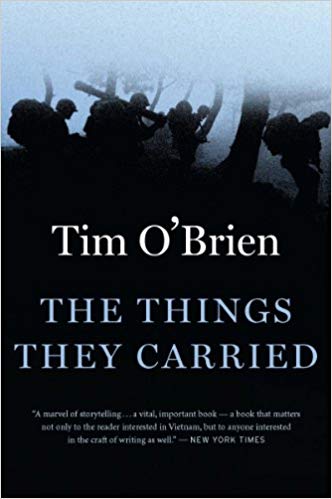

This article is an excerpt from the Shortform summary of "The Things They Carried" by Tim O'Brien. Shortform has the world's best summaries of books you should be reading.
Like this article? Sign up for a free trial here .
What happens in the chapter “Field Trip” in The Things They Carried? How does “Field Trip” demonstrate how soldiers seek closure after the war is over?
We’ll look at the basic elements of the chapter “Field Trip” (The Things They Carried) and look at how the narrator attempts to bring the Vietnam War to life for his young daughter.
“Field Trip” (The Things They Carried)
In this chapter of The Things They Carried, “Field Trip,” 43-year-old O’Brien returns to Vietnam with his ten-year-old daughter, Kathleen. He wishes to bring his war experience alive for his daughter by bringing her to the country that has defined so much of his life. While in Vietnam, Kathleen struggles to understand why the war happened and how her father came to be a part of it. He is unable to coherently explain to her either the political and ideological conflicts that created the conflict or the sequence of events that led to his personal decision to fight in it.
Eventually, O’Brien takes her to the setting of his most harrowing war experience—the field where Kiowa died. Both his daughter and the Vietnamese government interpreter who accompanies them are perplexed as to why he would choose to visit such a place. Kathleen almost immediately notices the stench of the field.
In “Field Trip” in The Things They Carried, O’Brien notes how ordinary and mundane the field looks today, nothing like the filthy hellscape it was the night Kiowa died. It is hard to imagine that this place has loomed so large in his mind for all these years—this field, after all, had killed his close friend, while transforming O’Brien himself into a different person than who he’d been before. This field was the cornerstone of his Vietnam trauma, the place that embodied all the filth and terror of the war. Now, however, he sees it for what it really is: just a drab and unremarkable patch of dirt in a far-flung corner of rural Vietnam, obscure and unremarkable.
In what he hopes is a final act of closure, O’Brien returns Kiowa’s moccasins to the field, letting them sink into the mud. Although a gifted writer, words fail him in this instant. He is unable to come up with anything poignant or meaningful to say during this moment of remembrance. He simply says, “Well, there it is,” as he looks back at the field one last time. In “Field Trip” in The Things They Carried, he feels that he has been buried in that field ever since that terrible night, but that now, perhaps, he has finally found his way out.
Blame
Earlier in the book, before “Field Trip” in The Things They Carried, O’Brien reveals why he was unable to write about Kiowa’s death. It is because he feels that he was responsible, not Bowker. Right before the attack, O’Brien and Kiowa had been talking together in the field, sharing stories from back home. O’Brien had shown Kiowa a picture of his girlfriend Billie and used a flashlight to illuminate the photograph. The light from the flashlight gave away the company’s position to the enemy, causing the firefight which led to Kiowa’s death. Naturally, O’Brien is haunted because he believes he is responsible for the gruesome death of his friend. This theme remains in “Field Trip” in The Things They Carried.
The next day, the men begin the mournful search for Kiowa’s body in the sewage field. Their boots sink into the filth as they wade through, trying to cover as much ground as they can. Eventually, they find Kiowa’s pack, containing a pair of moccasins and an illustrated New Testament.
Later, they find Kiowa’s submerged body, which requires several men to dig out from the muck. Finding the body causes the men to reflect on the random nature of life and death in Vietnam. What happened to Kiowa could just as easily have happened to any of them. Even Azar is driven to a moment of introspection after the incident. While earlier in the day he had been cracking jokes about Kiowa being “buried in shit,” he later tells his comrades, “Those dumb jokes—I didn’t mean anything.” After finding the pack, Mitchell Sanders becomes enraged at what he perceives as Lieutenant Cross’ incompetent decision to encamp the company in a sewage field, arguing that he ought to have exercised better field discretion and found a safer place for his men to spend the night. The grief of losing fellow soldiers and struggling with blame are also themes of “Field Trip” (The Things They Carried).
———End of Preview———

Like what you just read? Read the rest of the world's best summary of "The Things They Carried" at Shortform . Learn the book's critical concepts in 20 minutes or less .
Here's what you'll find in our full The Things They Carried summary :
- What the Vietnam War was like for soldiers on the ground
- How Vietnam soldiers dealth with the psychological stress of death around them
- How fictional stories can be truer than the truth






